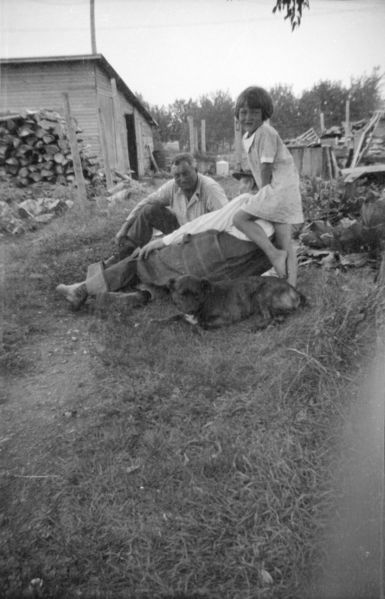 On a hot summer day, sittin’ on grandpa is the funnest thing for a pixie-cut girl to do. This photo hails from the late 1930s in rural Minnesota, and is the kind of candid real-life photo you hope to see out of dozens of posed, dour pictures of family members. It’s also a part of the farm photos don’t usually get taken at –nobody poses in front of the junk pile for a family picture. The jungle-gym is clearly Grandpa: he looks much the same in nearly every photo, up until the 50s. The guy sitting up, I’m unsure who he might be, possibly a hired hand. As a farm kid, I remember those summer days — “I’m bored; I should go bother Grandpa for a while.” Turns out, Grandpas usually spend all day hoping the grandkids stop by to interrupt his work.
On a hot summer day, sittin’ on grandpa is the funnest thing for a pixie-cut girl to do. This photo hails from the late 1930s in rural Minnesota, and is the kind of candid real-life photo you hope to see out of dozens of posed, dour pictures of family members. It’s also a part of the farm photos don’t usually get taken at –nobody poses in front of the junk pile for a family picture. The jungle-gym is clearly Grandpa: he looks much the same in nearly every photo, up until the 50s. The guy sitting up, I’m unsure who he might be, possibly a hired hand. As a farm kid, I remember those summer days — “I’m bored; I should go bother Grandpa for a while.” Turns out, Grandpas usually spend all day hoping the grandkids stop by to interrupt his work.
Category: Uncategorized
More Scenic California
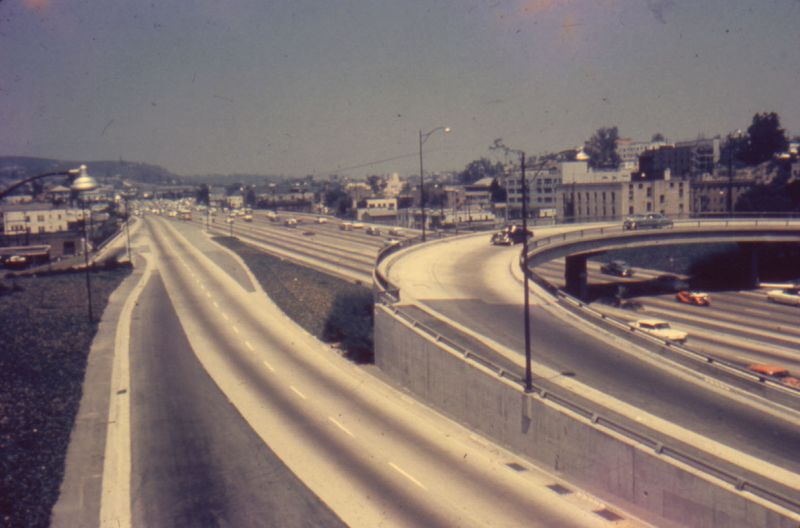
Well, here we’ve got an entirely different view of the Harbor Freeway (compared to a few weeks ago). California’s pride in their municipal freeways was immense: in theory, they provided an escape from the crowded streets of other metropolitan areas, and allowed for relaxing suburban living while working in the city. Today, we see this as Sprawl, a bad thing, but in the sixties it was The Way Of The Future.
see also: history of future la * 1970s concept la proposal * interior of lax * more 60s freeway (1) (2)
More Cranky Kids
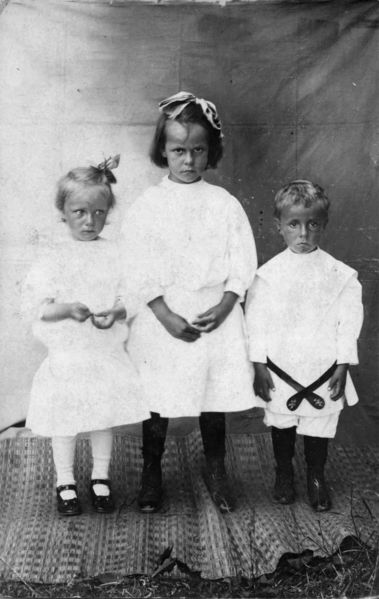 I’m not sure how these children relate to the grumps in this photo from last week, But they seem to share a venue and photographer. It’s the same (or very similar) venue, a folded sheet of some sort hung as a backdrop, with a dirt floor. The kids’ footing is improved by adding a reed mat on the ground for this photo, but it didn’t improve the children’s attitudes. Little Gunther looks like he’s about to cry, and the photographer is lucky Marta can’t actually start fires with her mind even though she’s trying really, really hard.
I’m not sure how these children relate to the grumps in this photo from last week, But they seem to share a venue and photographer. It’s the same (or very similar) venue, a folded sheet of some sort hung as a backdrop, with a dirt floor. The kids’ footing is improved by adding a reed mat on the ground for this photo, but it didn’t improve the children’s attitudes. Little Gunther looks like he’s about to cry, and the photographer is lucky Marta can’t actually start fires with her mind even though she’s trying really, really hard.
The style of dress is of a similar period as the previous photo, but a bit more formal: all white may signify some religious event is taking place (baptism, first communion, etc.), or it could be that their church-clothes are the nicest outfits they have to put on for a photographer.
The Fear Of Death
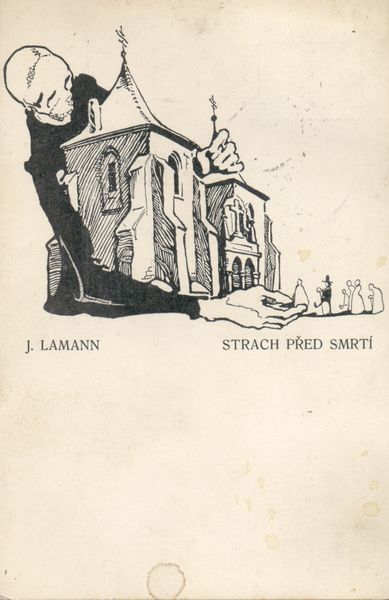 I bought a couple of these interesting postcards at a antique show recently. The drawings caught my eye, but the messages on them are a bit more striking as I’ve been figuring out what they say. They date from the very early 20th century — this one from 1909 — and they are all blatantly anti-religious, focusing on Christianity. This one doesn’t directly target the church itself, but the followers. The phrase “strach před smrtî“, as closely as I can translate, means “The fear of death.” To believe in something solely over fear of your eternal soul, the producer of this card believes, is a poor choice for faith. I’m still researching the postcards’ origins: they seem too early to be Communist, but religious opposition had many sources in that period. I should know a little more as I get to the other cards in the future.
I bought a couple of these interesting postcards at a antique show recently. The drawings caught my eye, but the messages on them are a bit more striking as I’ve been figuring out what they say. They date from the very early 20th century — this one from 1909 — and they are all blatantly anti-religious, focusing on Christianity. This one doesn’t directly target the church itself, but the followers. The phrase “strach před smrtî“, as closely as I can translate, means “The fear of death.” To believe in something solely over fear of your eternal soul, the producer of this card believes, is a poor choice for faith. I’m still researching the postcards’ origins: they seem too early to be Communist, but religious opposition had many sources in that period. I should know a little more as I get to the other cards in the future.
Laziness and the P.W.A.
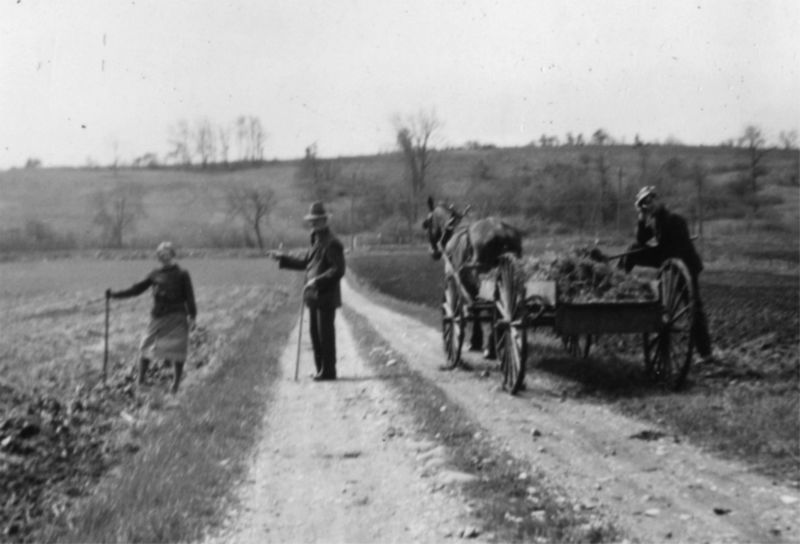
In 1933, the US government starting putting a large amount of money into public works, helping the economy, building communities, and keeping people working. The PWA, or Public Works Administration, did a lot of high-profile work, but the PWA helped communities and projects of all sizes. This picture was captioned “P.W.A. Workers” — however, they look hardly like a PWA project. The owner of the photo album had a sense of humor; the PWA (and its relative, the WPA) had a somewhat undeserved reputation for laziness. Ms. Photographer, it seems, saw a woman in the field — and the guys not working — as representative of the PWA, whether or not their paychecks came from the New Deal or not.
see also: the pwa *pwa thoughts * *pwa and nat’l parks * the wpa * wpa murals * wpa in georgia * wpa posters
1930s Nicknames
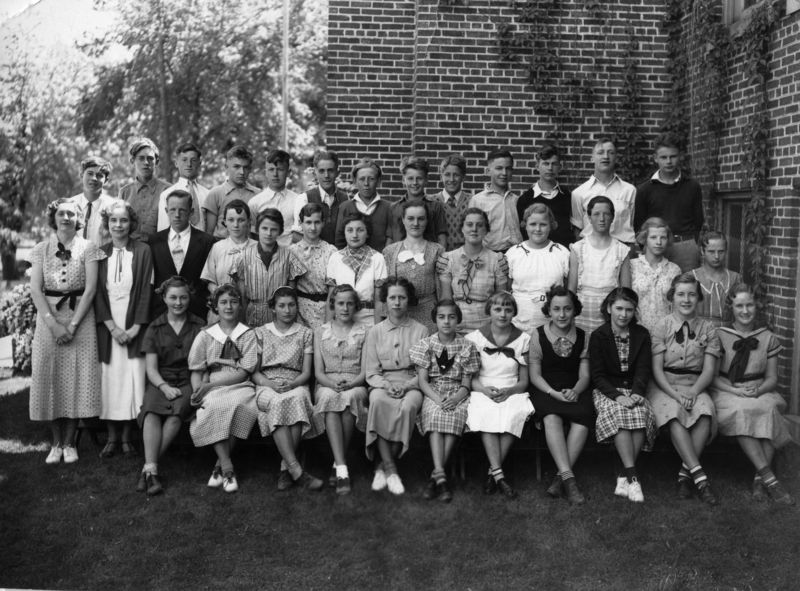
High school — a time of nicknames and rivalries no matter when you were born. This photo, from a photo-album of the late 1930s, has some evidence on the front. That girl in the front row in white — right in the middle — has her eyes blacked-out with pencil (you can see it in the large version). On the back were, presumably, well-wishes from student’s friends, names written in the hand of the signer. Underneath the photo, written on the page in the photo album, are a clearer picture of the students identities: “Bruno”, “Giggling Gertie”, “Ossie” — and I think that’s just the girls.
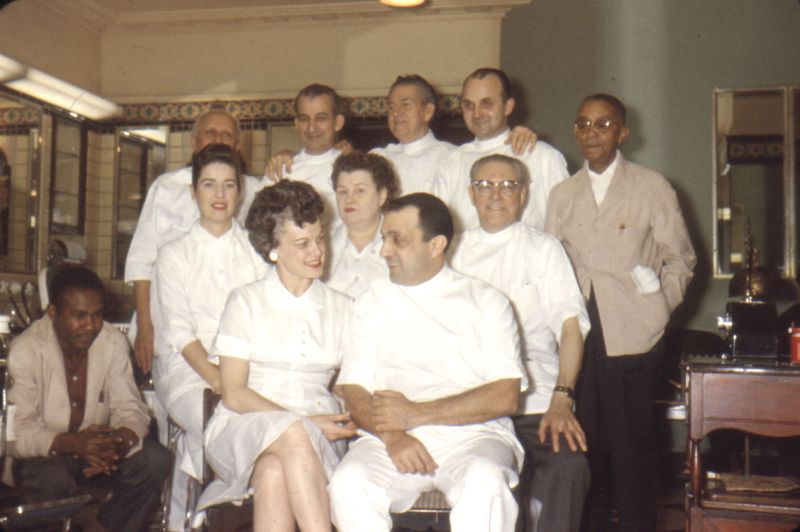 The couple in the front, members of the “Pfister Hotel Social Club” spent more time at the Pfister than just as customers: they appear to be the proprietors of the hotel barber shop. Several photos were taken, in hopes of getting a good shot where nobody’s blinking, everybody’s looking at the camera, and you can see everyone’s faces…they didn’t succeed.
The couple in the front, members of the “Pfister Hotel Social Club” spent more time at the Pfister than just as customers: they appear to be the proprietors of the hotel barber shop. Several photos were taken, in hopes of getting a good shot where nobody’s blinking, everybody’s looking at the camera, and you can see everyone’s faces…they didn’t succeed.
Retro Keep Clean Sign
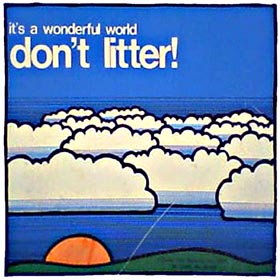 All the trash cans in a I94 rest area near Fergus Falls have this sign; I don’t think I’ve seen it at any of the other Minnesota stops we’ve made. I’ve tried to see if the illustrator is credited, but no luck. Whoever came up with this sign did a very effective job – it’s very eye-catching and it has some style. The use of thick lines and watercolory stripes has a very seventies feel. Using no-caps Helvetica is a little pretentious, but fits with the style of the image. I’m rather surprised it hasn’t turned up elsewhere — maybe off the freeway, somewhere.
All the trash cans in a I94 rest area near Fergus Falls have this sign; I don’t think I’ve seen it at any of the other Minnesota stops we’ve made. I’ve tried to see if the illustrator is credited, but no luck. Whoever came up with this sign did a very effective job – it’s very eye-catching and it has some style. The use of thick lines and watercolory stripes has a very seventies feel. Using no-caps Helvetica is a little pretentious, but fits with the style of the image. I’m rather surprised it hasn’t turned up elsewhere — maybe off the freeway, somewhere.
4H IH Scout
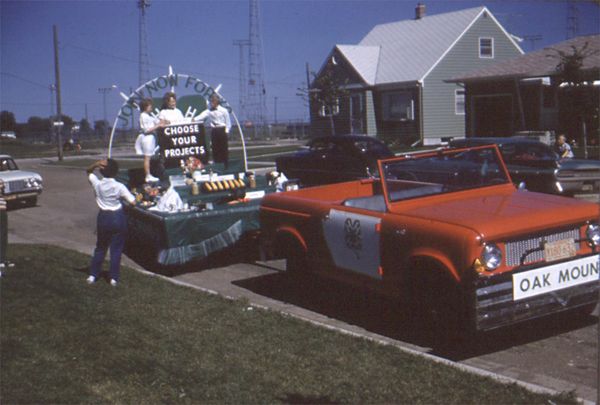 The float aside, that bright red truck is the focus here (also seen here, and here) The owner of this truck was a forward thinker: the shiny, new truck seen here was from the first year International Harvester made the Scout, its answer to the Jeep. At the time, tractor manufacturers weren’t specifically tractor manufacturers: they made all kinds of motorized stuff beneficial to farmers. IH saw a need for a heavy-duty farm vehicle that Willis’ Jeep was fulfilling, and came up with the Scout. Ford eventually followed with its Bronco, but the gas-conservation of the 70s mostly killed off these smaller versions of what we’d call an SUV. You may not know, but IH made the Scout until 1980: that’s almost 20 years on the road.
The float aside, that bright red truck is the focus here (also seen here, and here) The owner of this truck was a forward thinker: the shiny, new truck seen here was from the first year International Harvester made the Scout, its answer to the Jeep. At the time, tractor manufacturers weren’t specifically tractor manufacturers: they made all kinds of motorized stuff beneficial to farmers. IH saw a need for a heavy-duty farm vehicle that Willis’ Jeep was fulfilling, and came up with the Scout. Ford eventually followed with its Bronco, but the gas-conservation of the 70s mostly killed off these smaller versions of what we’d call an SUV. You may not know, but IH made the Scout until 1980: that’s almost 20 years on the road.
Cranky, Cranky Kids
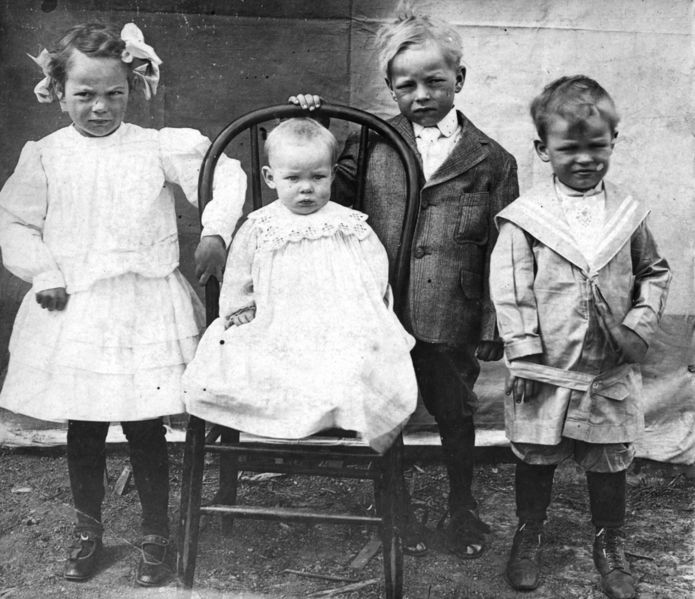
Oh, my — I know kids hate to get dressed up, but the dress clothes of today pale in comparison to the kids of the early 1900s. That sailor suit on the right? It would cause a riot among modern kids. The photo appears to me to be from a travelling photographer; the ground is dirt and grass, the chair is simple (probably recruited from the nearest building), and the backdrop is simple. Despite the outdoors, the camera is of a vintage without a speedy shutter, resulting in some blurriness. It could, however, also be an attempt to emulate a more expensive photo studio by hanging a sheet over the washline and getting the kids dressed up to the tees. Either way, the kids weren’t happy about it.
see also: edwardian kids clothes * poor during Progressive era * progressivism and children